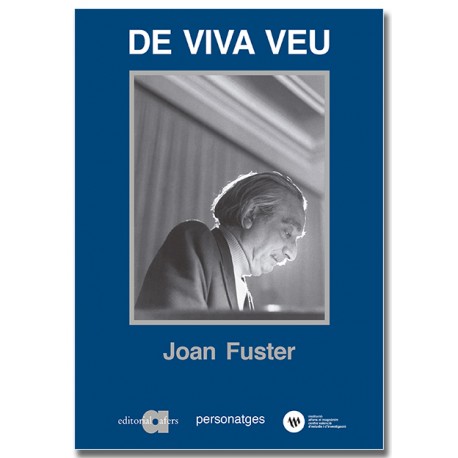No products
Prices are tax excluded
Product successfully added to your shopping cart
There are 0 items in your cart. There is 1 item in your cart.
 View larger
View larger
De viva veu
New
De viva veu. 592 p. / 2022 / catalan
Prologue Enric Sòria. Introduction Isidre Crespo
|
author Fuster, Joan |
|
More info
Fuster was a great conversationalist: fast, precise, ironic, often devastating. His Monday chat with friends or those he held until the early hours with the people who were going to visit him in Sueca are famous. In Fuster, even in the most doctoral of his historical works, there is always a rare symbiosis between speech and prose, as a colloquial naturality of writing. The reciprocal one was equally true. If his writing always maintains something of the dialoguing, persuasive proximity of the spoken word, the Oral Fuster also preserved much of the skill and incisive ingenuity of the professional writer. That, who didn't know, lost it. As the old adagi says, verb flies, scripta manent; the living word is intrinsically evanescent. Only lasts fixed in text, and with a text you cannot talk. The Oral Carpenter, the immediate great fencer of the divine and the human, has disappeared, but in these interviews, an echo of what it was survives in some way. Those who have not known him, will be surprised by the precision, the nuanced accuracy – often with citations, examples and data – and the clarity of the answers. This second edition of the book offers sixteen interviews more than the first. Some are occasional; others, on the other hand, are extensive, valuable and very revealing. Now we have a richer, more complex and complete book, even though the previous one. It's a pleasure to read it.
From the prologue of Enric Sòria
Joan Fuster (Sueca, 1922-1992) was an essayist, historian, literary critic and poet. An intellectual with historical projection, he committed himself to the country and its time. He is considered one of the most important essayists in Catalan of the 20th century, which became a civic and, to some extent, political reference of the generations of intellectuals after the Civil War. Of his immense work, the essay Nosaltres, els valencians (1962) stands out, a revulsive in the Valencian socie-tat of the time. He studied the work of Salvador Espriu, Josep Pla, Ausiàs March and Sant Vicent Ferrer, among others. His extensive output is embodied in about sixty books, around four thousand articles, published in various newspapers and magazines, numerous daily annotations, thousands of work cards and thousands of letters with other writers and intellectuals. In 1984 he was awarded an honorary doctorate by the Autonomous University of Barcelona, the University of Barcelona and the University of Valencia. He was awarded with awards such as the Premi d'Honor de les Lletres Catalanes and the Medalla d'Or of the Generalitat de Catalunya. Posthumously, the Council of the Generalitat Valenciana granted him the High Distinction to Cultural Merit. He was president of Acció Cultural del País Valencià and of the Associació d'Escriptors en Llengua Catalana.
Reviews
No customer reviews for the moment.


